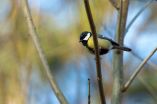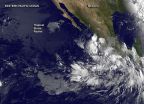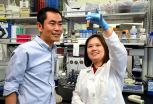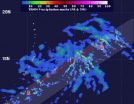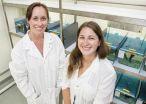(Press-News.org) Researchers of Ludwig-Maximilians-Universitaet (LMU) in Munich report that a new class of chemical compounds makes cancer cells more sensitive to chemotherapeutic drugs. They have also pinpointed the relevant target enzyme, thus identifying a new target for anti-tumor agents.
Researchers led by LMU's Professor Angelika Vollmar and Professor Stephan Sieber of the Technische Universität München have identified a class of chemicals that represent a potential new weapon in the fight against malignant tumors. The compound is itself non-toxic, but it stimulates the killing of rapidly dividing cells by chemotherapeutic drugs. This sensitizing effect means that the latter can be used in lower doses, which makes it less likely that the target cells will become resistant to their lethal effect. The work was carried out by an interdisciplinary collaboration made up of scientists from LMU, TUM and the Saarland University in Saarbrücken, and the results appear in the latest issue of the journal Angewandte Chemie – International Edition.
Chemotherapy of malignant tumors is complicated by the fact that, over time, rapidly dividing cancer cells tend to become resistant to the drugs used. "One way to avoid this is to administer the agent in conjunction with an otherwise innocuous compounds that makes cells more vulnerable to its deleterious effects, and induces them to undergo programmed cell death," says Angelika Vollmar, Professor of Pharmaceutical Biology at LMU.
The collaborative venture has led to the discovery of new class of chemical compounds, referred to as T8, which specifically sensitizes cells to the effect of the anti-cancer drug etoposide, which inhibits the growth of tumor cells by inducing the formation of breaks in the DNA. "The interdisciplinary approach and the close cooperation between chemists and biologists made a crucial contribution to the success of our project," says Vollmar. The scientists have also identified protein disulfide isomerase (PDI) as the target of the new agents. PDI is an enzyme that modifies the spatial conformation, and thus the functional state, of proteins involved in a wide variety of cellular functions.
A major advantage of the new compound is that it is intrinsically non-toxic. Moreover, its functional impact on its target enzyme is reversible. Only when it is administered together with a chemotherapeutic agent do its effects on cellmetabolism become manifest. "The combination of a sub-toxic concentration of etoposide with the new T8 compounds makes cells more susceptible to programmed cell death," says Vollmar.
The researchers elucidated the new compound's mode of action in a series of cell biological and biochemical experiments. "Our studies show that T8 is a very promising lead compound, as it is capable of exercising a chemosensitizing effect on diverse types of cancer cells. The drug has been tested on a variety of different tumor cells including leukemia, pancreatic and breast cancer cell lines. "In the next phase of the project, this new class of chemosensitizers will be optimized and tested in a variety of in-vivo animal models, and the compounds will be used to probe the functional significance of PDI as a drug target for tumor therapy." The work was supported by grants from the Wilhelm Sander Foundation and the DFG.
INFORMATION:
Cancer therapy: Driving cancer cells to suicide
2014-09-30
ELSE PRESS RELEASES FROM THIS DATE:
Scientists identify which genes are active in muscles of men and women
2014-09-30
If you want your doctor to know what goes wrong with your muscles because of age, disease or injury, it's a good idea to know what "normal" actually is. That's where a new research report published in the October 2014 issue of the FASEB Journal comes in. In the report, a team of scientists produce a complete transcriptome—a key set of molecules that can help scientists "see" which genes are active in an organ at a particular time. What's more, they found never-before-detected gene activity and that men have approximately 400 more active genes in their skeletal muscle than ...
Synthetic sperm protein raises the chance for successful in vitro fertilization
2014-09-30
Having trouble getting pregnant—even with IVF? Here's some hope: A new research report published in October 2014 issue of The FASEB Journal, explains how scientists developed a synthetic version of a sperm-originated protein known as PAWP, which induced embryo development in human and mouse eggs similar to the natural triggering of embryo development by the sperm cell during fertilization.
"We believe that the results of this study represent a major paradigm shift in our understanding of human fertilization by providing a precise answer to a fundamental unresolved scientific ...
Genetic test for cancer patients could be cost-effective and prevent further cases
2014-09-30
Screening for a genetic condition in younger people who are diagnosed with bowel cancer would be cost-effective for the NHS and prevent new cases in them and their relatives, new research has concluded.
Researchers at the University of Exeter Medical School were funded by the National Institute for Health Research Health Technology Assessment (NIHR HTA) Programme to assess the effectiveness and cost-effectiveness of screening for Lynch Syndrome. Their findings, published in Health Technology Assessment, indicate that screening the 1,700 people under the age of 50 who ...
Risky metabolism
2014-09-30
This news release is available in German.
Animals often differ in their behavioural response to risky situations such as exposure to predators. Researchers from the Max Planck Institute for Ornithology now found in a long-term study on different populations of great tits that risk-taking behaviour correlates with both metabolic rate and ambient temperature. High metabolic rates and low temperatures were associated with high risk-taking behaviour, as in these scenarios birds were more likely to approach potential predators.
The readiness to take a risk is to a ...
New blood test determines whether you have or are likely to get cancer
2014-09-30
A new research report published in the October 2014 issue of The FASEB Journal may make the early detection of cancer as easy as a simple blood test. This test, called the "lymphocyte genome sensitivity" (LGS) test, could not only detect some cancers earlier than ever before, but it may eliminate the need for some types of biopsies, as well as identify those more likely to develop cancer in the future.
"The test could allow earlier cancer detection, so helping to save peoples' lives," said Diana Anderson, a researcher involved in the work from the School of Life Sciences ...
Tropical Storm Rachel dwarfed by developing system 90E
2014-09-30
Tropical Storm Rachel is spinning down west of Mexico's Baja California, and another tropical low pressure area developing off the coast of southwestern Mexico dwarfs the tropical storm. NOAA's GOES-West satellite showed the size difference between the two tropical low pressure areas.
NOAA's GOES-West satellite captured an image of the Eastern Pacific Ocean on Sept. 30 at 1200 UTC (8 a.m. EDT). In the infrared image, Tropical Storm Rachel appeared small in comparison to the low pressure area called System 90E, coming together hundreds of miles south. As Rachel spins down ...
Virginia Tech researchers discover potential biomarker to detect 'bubble boy' disorder
2014-09-30
Many people recognize "the bubble boy" as an unusual character from a "Seinfeld" episode or a John Travolta movie.
But in reality, a genetic disease called SCID, short for severe combined immunodeficiency, forces patients to breathe filtered air and avoid human contact because their bodies' natural defenses are too weak to fight germs.
Although it affects fewer than 2,000 new births each year worldwide, SCID is a cousin to acquired immune deficiency syndrome triggered by a human immunodeficiency virus — HIV/AIDS.
Now, using a mouse model, Virginia Tech researchers ...
NASA's TRMM satellite sees Tropical Storm Phanfone fragmented
2014-09-30
The bands of thunderstorms wrapping around Tropical Storm Phanfone in the Northwestern Pacific Ocean appeared fragmented to NASA's TRMM satellite.
On Sept. 30, a typhoon watch remains in effect for the far northern Marianas Islands including Pagan and Alamagan. Tropical storm warnings have been cancelled for Tinian and Saipan, but remain in effect for Pagan, Alamagan and surrounding waters. A flash flood watch remains in effect for the island of Saipan. For updated forecasts for these islands, visit the U.S. National Weather Service Office's Guam website: http://www.prh.noaa.gov/guam/cyclone.php.
On ...
A heartbeat away? Hybrid 'patch' could replace transplants
2014-09-30
Because heart cells cannot multiply and cardiac muscles contain few stem cells, heart tissue is unable to repair itself after a heart attack. Now Tel Aviv University researchers are literally setting a new gold standard in cardiac tissue engineering.
Dr. Tal Dvir and his graduate student Michal Shevach of TAU's Department of Biotechnology, Department of Materials Science and Engineering, and Center for Nanoscience and Nanotechnology, have been developing sophisticated micro- and nanotechnological tools — ranging in size from one millionth to one billionth of a meter — ...
In stickleback fish, dads influence offspring behavior and gene expression
2014-09-30
CHAMPAIGN, Ill. — Researchers report that some stickleback fish fathers can have long-term effects on the behavior of their offspring: The most attentive fish dads cause their offspring to behave in a way that makes them less susceptible to predators. These behavioral changes are accompanied by changes in gene expression, the researchers report.
The findings appear in the Proceedings of the Royal Society B: Biological Sciences.
"There is lots of evidence that moms are very important for their offspring," said University of Illinois animal biology professor Alison Bell, ...
